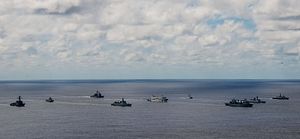Last week, local media reports confirmed that Brunei’s defense budget had been raised by about 4.7 percent to 564 million Brunei dollars ($408 million) for the 2016-2017 fiscal year. Despite the minor hike, the figure still suggests that the tiny, oil rich Southeast Asian state is facing lingering challenges as it tries to adequately fund its defense needs amid economic distress.
Last year, Brunei’s defense spending was slashed by over 25 percent for 2015 (from BND 719.15 million to BND 537.49 million). As I noted then, it came as no surprise. Brunei is highly dependent on the energy sector – with oil and gas accounting for around 70 percent of the country’s nominal GDP and almost all of its exports. With energy prices declining, the country’s economy has suffered, and the defense budget, which has remained quite steady over the past few years at about 2.5 percent of GDP, is just the latest casualty of this broader problem.
Given this, the increase this year is more accurately a small step towards gradually reversing last year’s deep cut. Abdul Rahman Ibrahim, the second finance minister at the Prime Minister’s office, admitted as much when he told the 12th Legislative Council on March 9 that despite the minor increase, the ministry will adopt several “austerity measures” given weak global energy prices. According to The Brunei Times, he added that several planned projects had already been postponed or canceled and that some services may even be outsourced to improve efficiency in the future. As if to emphasize how dire the situation is, he even said that the defense ministry (MinDef) will have to review rental rates for the Brunei Darussalam International Defense Exhibition Hall so that revenue covers the cost of maintenance.
In terms of the breakdown, within the new budget, around BND 330 million would go to personnel expenses, BND 139 million to recurring expenditure, and BND 94 million to special expenditure. Compared to the breakdown for the 2015-2016 budget, personnel expenses remained largely unchanged, with recurring expenditure seeing a significant decrease of around 17 percent.
Interestingly, the special expenditure portion of the budget, which was slashed by 86 percent last year, saw an increase this year from BND 32 million to BND 94 million. While no specific reasons were explicitly given for this increase, Abdul Rahman did say that the budget included provisions for upgrading defense capabilities previously under control of the finance ministry and now transferred to the defense ministry. Last year he had attributed the slash in special expenditures to the transfer of funding for a Defense Capability Enhancement Project from the defense ministry to the finance ministry. Accounting for these shifts in funds between ministries, the overall increase this year appears largely to be due to a return of previously redirected funds rather than something new.
All this suggests that beyond the headlines, Brunei’s defense budget increase this year masks its continuing struggle to keep financing its defense needs as its economy suffers.































